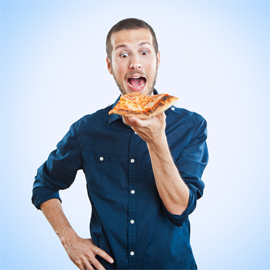 A craving is an intense desire or longing for a certain thing. Perhaps the most common type of craving talked about is the food craving, and chances are you’ve experienced one or two yourself before getting weight loss surgery. Cravings are often for a specific taste—maybe something salty or something sweet. They are generally prompted by some sort of external stimulation, such as an advertisement or a picture of someone casually eating or drinking that item.
A craving is an intense desire or longing for a certain thing. Perhaps the most common type of craving talked about is the food craving, and chances are you’ve experienced one or two yourself before getting weight loss surgery. Cravings are often for a specific taste—maybe something salty or something sweet. They are generally prompted by some sort of external stimulation, such as an advertisement or a picture of someone casually eating or drinking that item.
It often seems that the only way to overcome a craving is to give in to it, but that isn’t true. Cravings thrive on your thoughts. The more you think about the item you are craving, the more intense that craving becomes and the harder it becomes to resist.
Bariatric Surgery Reduces Cravings
A 2012 study published in the Journal of Surgery for Obesity and Related Diseases found that patients who underwent weight loss surgery experienced cravings less often than people who tried to lose weight through other, non-surgical methods.
Starting three to six months following surgery, participants reported that they weren’t experiencing the same cravings for sweet and salty foods as they had prior to their operation. This drop in cravings was not noted for fatty foods, though many participants reported fewer cravings for fast food in particular.
When cravings did occur, the post-bariatric patients were less likely to give into the craving than were individuals who did not undergo weight loss surgery.
Why the change?
Cravings are sharpest for items we think about and know. This is usually the items that we are surrounded with the most. In a lot of ways cravings are subject to availability.
After weight loss surgery, you’ll be encouraged to reduce your exposure to these foods. When you put things like fast food, sweets and salty snacks out of sight, they will eventually fall out of mind. This may offer some explanation as to why cravings were reduced after weight loss surgery.
When cravings do occur, do your best to manage them with these tips:
- Think of something else: Start reading a book, change the channel or call a friend. Occupy your mind so you can stop dwelling on the item you are craving.
- Put yourself in action: Start exercising, cleaning the house or gardening. Do something that will keep your hands busy so you don’t want to eat.
- Avoid problem places: When you have a craving, do your best not to gravitate towards places that will make resisting it more of a challenge. This includes places like the office vending machine, the food store or mall food-court.
Cravings can be problematic after weight loss surgery. While you may find that you experience them less often, you still should be careful not to give into any that do develop. Try keeping these tips in mind, and focus on consuming foods that help your body feel good.